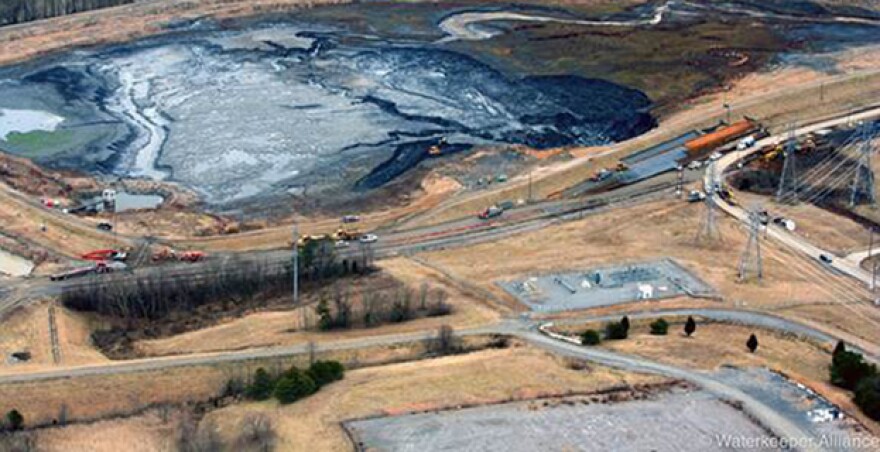The North Carolina General Assembly is sending Governor Pat McCrory a plan for Duke Energy’s coal ash ponds. It could become the first legislation in the country to try to mitigate the pollution from ashes left over from burning coal.
To get an idea of why lawmakers were under pressure to take action, here are some images from a video Green Peace recorded in February: The group flew a helicopter over the Virginia-North Carolina line. You can see the Dan River flowing past the town of Eden. The river water is its typical brownish, greenish color, but as it meets a coal burning power plant a ribbon of gray sludge starts streaming into the water. That’s what it looks like when 39,000 tons of ash are spilling.
Six months and dozens of meetings later, North Carolina lawmakers have a plan for this coal ash pond and 32 others like it.
“This is a first in the nation effort to address the coal ash issue," Representative Chuck McGrady (R-Hendersonville), one of the bill writers, told House of Representatives yesterday. “No other state has undertaken what we're undertaking today. We had no model to use to come up with the bill, and that's why it took the time it did."
Lawmakers want to force Duke Energy to manage the ponds within 15 years. And they want to appoint a commission that will determine how soon and how aggressively Duke has to act.
Agreeing on this plan took a lot of negotiating. Talks between the House and Senate almost broke down over some ponds that sit in areas where the ground is saturated with water. McGrady says he wanted to make sure Duke wouldn’t be allowed to simply drain the water from those ponds and cap the ash with dirt.
“We're trying to clearly say to everyone that there are coal ash ponds that are not appropriate to be capped in place, and most of them are along the coast because the water table is pretty close to what these ponds are at,” McGrady says.
The reaction from conservation groups was swift. The plan does not do enough, says Frank Holloman, an attorney with the Southern Environmental Law Center.
"If you stand back and look at this bill, you would have to say this is a bill where Duke won," Holloman says. “This bill could've been very simple. It did not have to be this long and convoluted. They could've simply said, 'If your coal ash contaminates ground water, it's got to be moved.' ”
Holloman says the plan allows Duke to get permission to legally leak harmful chemicals from ponds. And it reverses a court ruling that Holloman says forced Duke to immediately address certain kinds of contamination.
A separate complaint -- this one largely from Democrats who voted against the bill -- is that Duke will be able to apply to charge customers for the cost of handling the ash... which could be up to 10 billion dollars.
In a statement, Duke’s President and CEO, Lynn Good, says the company will start working to meet the requirements of the bill. And she says the plan creates a stronger standard for coal ash management.
The writers of the bill themselves say there’s room for improvement. After approving the bill Wednesday night, Sen. Tom Apodaca (R-Hendersonville) said the General Assembly could take up this issue again.
"I mean, we're going down a new frontier here, and it's the first time we've tried to regulate this, and it's the first time in the United States, really, this kind of legislation's been put forth. So I'm sure there will be something we'll need to tweak," Apodaca says.
The governor is expected to sign the bill. If he does, Republican lawmakers will be able to claim they kept one of their main promises for the legislative session.









